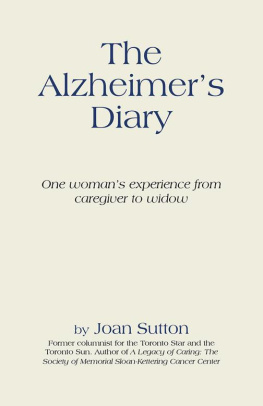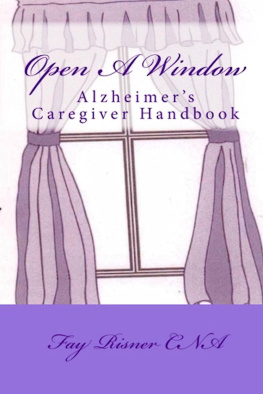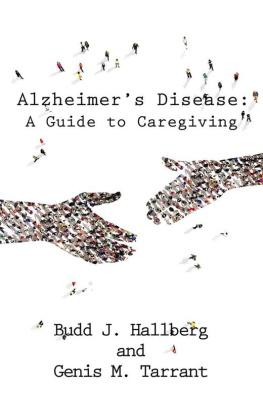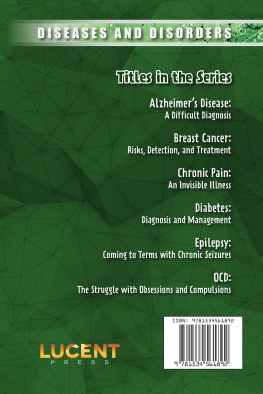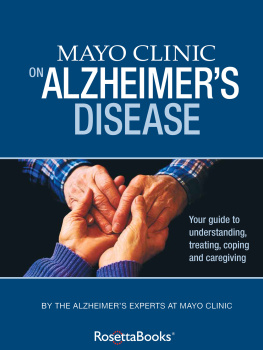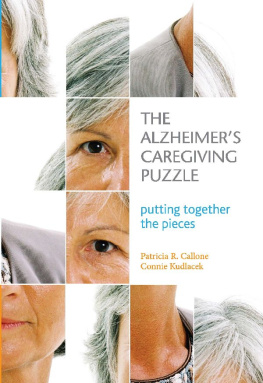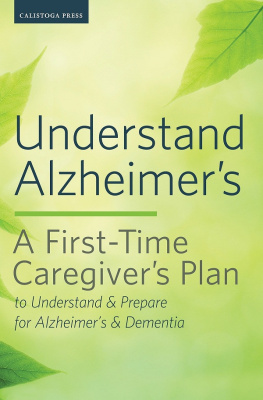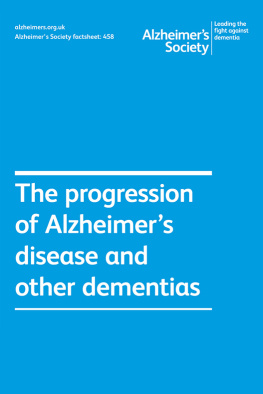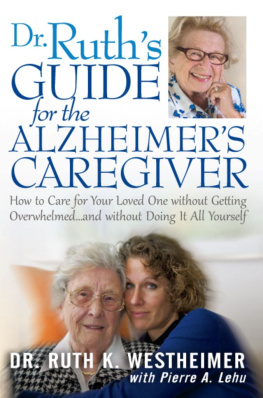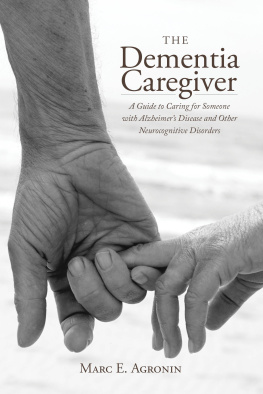Books by Joan Sutton
Lovers and Others . Toronto: Clarke Irwin & Co. Ltd., 1974.
Once More with Love . Toronto: Clarke Irwin & Co. Ltd., 1976.
Clothing and Culture . Toronto: McClelland & Stewart Limited, 1975.
Love Lines . Toronto: Toronto Sun Publishing, 1979.
All Men Are Not Alike . Toronto: McClelland & Stewart Limited, 1979.
A Legacy of Caring: The Society of Memorial Sloan-Kettering Cancer Center . Foreword by Laurence Rockefeller. New York: The Society of MSKCC, 1996.
The
Alzheimers
Diary
One womans experience
from caregiver to widow
JOAN SUTTON

THE ALZHEIMERS DIARY
ONE WOMANS EXPERIENCE FROM CARE GIVER TO WIDOW
Copyright 2014 Joan Sutton.
All rights reserved. No part of this book may be used or reproduced by any means, graphic, electronic, or mechanical, including photocopying, recording, taping or by any information storage retrieval system without the written permission of the publisher except in the case of brief quotations embodied in critical articles and reviews.
iUniverse
1663 Liberty Drive
Bloomington, IN 47403
www.iuniverse.com
1-800-Authors (1-800-288-4677)
Because of the dynamic nature of the Internet, any web addresses or links contained in this book may have changed since publication and may no longer be valid. The views expressed in this work are solely those of the author and do not necessarily reflect the views of the publisher, and the publisher hereby disclaims any responsibility for them.
Any people depicted in stock imagery provided by Thinkstock are models, and such images are being used for illustrative purposes only.
Certain stock imagery Thinkstock.
ISBN: 978-1-4917-3161-1 (sc)
ISBN: 978-1-4917-3162-8 (hc)
ISBN: 978-1-4917-3163-5 (e)
Library of Congress Control Number: 2014906588
iUniverse rev. date: 03/05/2015
Contents
For my beloved Oscar
Even memory is not necessary for love. There is a land of
the living and a land of the dead and the bridge is love.
Thornton Wilder, The Bridge of San Luis Rey (1927)
A LZHEIMERS DISEASE AFFECTS US ALL.
Up to 40 percent of people who reach age 80 (thats most of us) will get Alzheimers disease and suffer up to 10 years of progressive cognitive and functional decline, becoming increasingly dependent on others and ultimately entering a state in which the body remains but the mind is completely gone. This is an ungodly, surreal, zombie-like, humanoid state of being. Ultimately, everyone diagnosed will die from Alzheimers disease, a chronic, progressive, inevitably fatal illness that kills mostly as a result of pneumonia that occurs when patients forget how to swallow, causing food to persistently get in the lungs.
Alzheimers affects us all as friends and family, caregivers and supporters. Most of us will be caring for someone with Alzheimers disease during our lifetime, perhaps a spouse, parent, sibling or friend.
And it is expensive. One year of home care or nursing home care costs about $100,000. Nationwide, Alzheimers is the third most expensive disease after heart disease and cancer.
And now we think of Alzheimers as a disease of young and middle age, not only because we now know that it begins in midlife as a result of new brain-scanning technology developed in part by our foundation, but also because the younger generations will bear the economic burden of the rapidly aging baby-boomer population that will suffer Alzheimers disease.
But there is hope. Currently, more than 75 human clinical trials are testing new drugs for Alzheimers disease. Our foundation, the Alzheimers Drug Discovery Foundation (www.AlzDiscovery.org), has received over 3,000 new ideas for new drugs for Alzheimers since 1998, and we have funded over 420 of these in 18 countries. The FDA approved the first diagnostic test for Alzheimers disease in 2012, a test also developed by our foundation. Collaborative efforts of foundations like ours, government (the National Institutes of Health), industry (pharmaceutical and biotechnology companies) and academic institutions are all working together to discover new drugs.
In the meantime, the suffering of patients and their caregivers remains paramount. Their struggles and triumphs are the real story of Alzheimers disease. Joan Sutton Straus knows this reality personally and deeply. That is certainly clear from her passionate, sometimes desperate, sometimes humorous and always honest and forthright story of her life with her beloved husband as he declined into the depths.
Sharing stories of our lives brings us together. Joan does that so well.
Howard Fillit, MD
The Alzheimers Drug Discovery Foundation
M Y HUSBAND AND I HAD BEEN TOGETHER FOR 26 YEARS when, in 2006, he was diagnosed with Alzheimers disease (AD).
Seven years later, I observed our wedding anniversary as a widow.
For me, the intervening years were a roller coaster of emotions as I assumed new responsibilities, learned new skills and lived with an aching loneliness of the heart. Although my husband could not communicate his feelings as he passed through the various stages of Alzheimers, I am certain he experienced great frustration, embarrassment, anger, fearall the emotions one would expect when a proud and productive man finds himself being robbed of dignity and self. But then, I firmly believe that even in the worst stages of Alzheimers, there is a human being in there, lost but still present.
Writing has always been therapy for me, and these essays began as a way for me to sort out my own emotions and express my frustration at the lack of curative treatment as well as my fury at the gods for letting this happen to my beloved partner. As I had been a journalist, writing a daily column for the Toronto Sun and then the Toronto Star , friends suggested that I post my thoughts as a blog on WordPress.com . I hesitated. It is one thing to write about myself but it was quite another to discuss my husbands illness in public.
As I began to learn more about AD, I recognized the need for public pressure to support more research. In speaking out, I was encouraged by the examples of Nancy Reagan, Yasmin Khan (whom I interviewed for the Toronto Star about the effects of Alzheimers on her mother, Rita Hayworth), Glen Campbell, the family of the legendary New York Giants running back Ron Johnson, and, Mel Goodes, the former CEO of Warner-Lambert.
Mel became a vocal advocate for Alzheimers patients when he was diagnosed, at the age of 74, with AD. His words about trying to find relevance in a world where Alzheimer patients are not supposed to be seen or heard rang a bell with me. I too needed to find some relevance, some way to make sense of what was happening to my husband, to me, and to our family. That led to my accepting Leonard Lauders invitation to join the board of overseers of the Alzheimers Drug Discovery Foundation and my decision to publish my essays. Shortly after starting with WordPress, Danielle Crittenden Frum asked me to join the Huffington Post . Most of the essays in this book have been published in those forums. Where necessary, I have updated them, and in some cases, I have provided new information. I wrote them as stand-alone pieces, some of which would be of more interest to readers than others, so some basic information is repeated.
Not being of the Internet generation, I wasnt sure what a blog was (and didnt like the sound of the word essay sounds so much more dignified), but I gave it a try, not sure anyone out in that strange universe would be interested. To my surprise, there was a responsealthough the Huffington Post does not keep statistics for bloggers, WordPress.com has recorded more than 5,000 views from 40 countries around the world. That is gratifying to me as a writer, but it is also sobering, as the number reflects another set of numbersthe terrifying statistics of those who have or are affected by Alzheimers disease.
Next page
